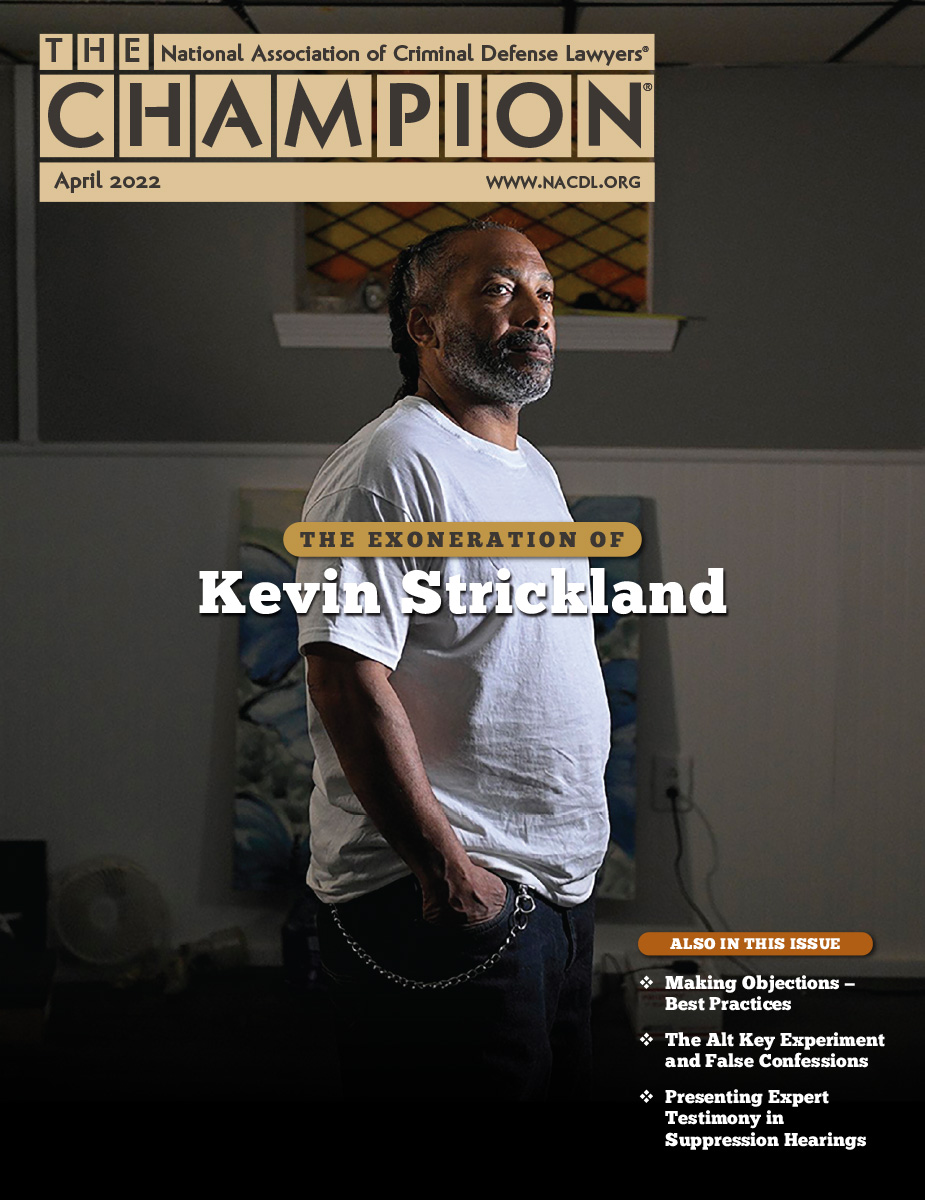April 2022

What mistakes and omissions resulted in Kevin Strickland being imprisoned for 43 years for a crime he did not commit?
Articles in this Issue
-
ABA Formal Opinion 500 Clarifies How Duties of Competence, Communication, and Supervision
Extend to Language Access
ABA Formal Opinion 500 makes clear that Model Professional Rules of Conduct 1.1, 1.4, and 5.3 apply to language access. The opinion instructs that lawyers (1) must make assessments as to when an interpreter or translator is needed; (2) cannot make the client responsible for procuring the service; and (3) bear the responsibility for making sure that the client understands the lawyer’s advice.
-
Affiliate News
What events are NACDL affiliates hosting this month? Find out here.
-
An Alliance for Justice: The Exoneration of Kevin Strickland
The system took 43 years to correct the errors that stole much of Kevin Strickland’s life. The government never meaningfully challenged the evidence of his innocence, yet it fought and delayed his release at every turn. This is the story of Kevin Strickland’s exoneration and the people who brought him home.
-
Book Review: A Defender’s Guide to Federal Evidence by Rene Valladares
This month Cuauhtemoc Ortega reviews A Defender’s Guide to Federal Evidence: A Trial Practice Handbook for Criminal Defense Attorneys by Rene L. Valladares.
-
Book Review: Don’t Forget Us Here by Mansoor Adayfi
This month Jon M. Sands reviews Don’t Forget Us Here: Lost and Found at Guantánamo by Mansoor Adayfi in collaboration with Antonio Aiello.
-
Book Review: Scrapped by Lisa Peebles and John O’Brien
This month Cara Wieneke reviews Scrapped: Justice and a Teen Informant by Lisa Peebles and John O’Brien.
-
From the President: Meaningful Diversity on the Federal Bench
We should celebrate Justice Ketanji Brown Jackson’s elevation to the U.S. Supreme Court. She is one of the most qualified judges to have been confirmed to the Court. Her brief service as a public defender, however, does not redress the lack of professional diversity and balance needed for our courts to police the line between government authority and government abuse at the state and federal levels.
-
Getting Scholarship Into Court Project
The “Getting Scholarship Into Court Project” brings helpful law review articles and other writings to the attention of criminal defense attorneys. The project’s purpose is to identify scholarship that will be especially useful to courts and practitioners. Summarized on this page are articles the project’s advisory board recommends that practicing lawyers take the time to read. To recommend articles for this column, contact Professor Jenny Carroll (jcarroll@law.ua.edu).
-
Making Objections — Best Practices
Adam Shlahet and Steven Epstein believe that during a trial the most important people in the room are sitting in the jury box. It is through this jury-focused lens that they discuss best practices for making objections. What is the basis of the objection? Is the objection cost-beneficial? Does the fact at issue bear on the case theory? Objections require defense counsel to make a split-second decision.
-
NACDL News: NACDL Celebrates Historic Confirmation of Judge Ketanji Brown Jackson to Supreme Court
NACDL News for April 2022
-
NACDL News: NACDL Co-Hosts ‘Have Her Back’ Event
NACDL News for April 2022
-
NACDL News: NACDL Condemns the Continued Use of Dangerous ‘No Knock’ Warrants, Calls to End Practice
NACDL News for April 2022
-
NACDL News: NACDL Mourns Loss of Former Board Member John Kenneth Zwerling
NACDL News for April 2022
-
Presenting Expert Testimony in Suppression Hearings
Modern technology used by the police (including drones and mobile device forensic tools) and ever-changing drug laws make suppression hearings more challenging for the defense team. Advocates must invoke the Fourth Amendment in a world much different from the one in which the amendment was drafted. The defense attorney must create a well-developed record in support of a client’s claims. One method of developing the record is the use of experts to explain changing science and technology.
-
So Misunderstood: The Alt Key Experiment and False Confessions
Researchers instructed college students to type on a computer keyboard, but students were warned that hitting the ALT key would cause the computer to crash. Later the researchers falsely accused the students of hitting the forbidden key. What percentage of students, presented with bogus evidence, confessed and supplied details about an act they did not commit? Some courts have ruled that the ALT key experiment has no merit, but in appropriate false confession cases defense counsel must educate courts about the experiment’s value.
